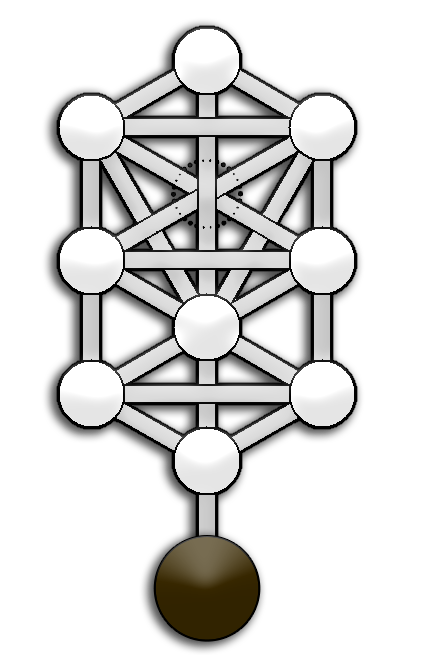Malkuth | מלכות
Malkuth, representing "the kingdom" in Hebrew, is derived from the word Melech, which translates to "king." The symbiotic relationship between a kingdom and its king, their existence predicated on one another, illustrates the integral relation between Malkuth and the divine. No kingdom can exist in the absence of its king, just as no king can rule without his kingdom.
This sphere, Malkuth, is the physical plane, the realm of materialization, encapsulating the elements perceptible to our senses. It symbolizes the universe manifesting at its peak concreteness, materialization, and corporeality. One could conceive it as the sphere of the body, of tangible elements, and of our senses that allow us to navigate and experience our physical reality.

Malkuth, representing "the kingdom" in Hebrew, is derived from the word Melech, which translates to "king." The symbiotic relationship between a kingdom and its king, their existence predicated on one another, illustrates the integral relation between Malkuth and the divine. No kingdom can exist in the absence of its king, just as no king can rule without his kingdom.
This sphere, Malkuth, is the physical plane, the realm of materialization, encapsulating the elements perceptible to our senses. It symbolizes the universe manifesting at its peak concreteness, materialization, and corporeality. One could conceive it as the sphere of the body, of tangible elements, and of our senses that allow us to navigate and experience our physical reality.
Malkuth assumes a vital position in the Tree of Life, depicting the final stage of all emanations, with the sefirot also referred to as such emanations. These cosmic vibrations, these emanations, culminate and achieve stability and corporeality in Malkuth, primarily flowing through the ninth Sefira, Yesod.
Through the lens of involution and evolution, Malkuth marks the terminal point of involution, the process of descending down the Tree. All life must traverse this point before it can culminate its growth and ascend the Tree, returning to its divine source, thereby commencing the phase of evolution.
Malkuth represents matter in both its dense and subtle aspects, extending to the Etheric plane. It signifies matter coupled with the earth's soul, its psychic aspect, and the aura enveloping all things. Human consciousness perceives Malkuth through the brain, facilitating the mode of perception through our physical senses, both internal and external.
It's noteworthy that Malkuth harbors the divine Light—the infinite Light, the substance of Creation—albeit in a state of maximum conceality. This Light, though seemingly contracted and hidden, is ever-present, its diminishment only apparent from our limited human perspective. Despite the illusion of solidity and impenetrability our material plane projects, it's mostly vacant, much like Malkuth, which is effusive with Light. We may be currently unable to perceive it due to our physical limitations, but the Light pervades all around us.
Symbolically, Malkuth has been described as the Daughter, the Wife, the Queen, the Shekhinah—referring to the divine presence, the feminine aspect of God in exile with creation. In a future state when matter becomes completely transparent to the Light, it will mark the advent of the Kingdom of God. As beings who have evolved most on planet Earth, it becomes the human responsibility to strive towards establishing this Kingdom in harmony with the planet's essence.
The sefirot preceding Malkuth transmit their energies to it via Yesod. Thus, in Malkuth, we find ourselves at the nexus where everything descending through different sefirot manifests. Malkuth serves as the viewing point to witness the energies from higher realms.
Spiritual resistance forms the basis for our work on Malkuth. The practice entails curbing our selfish desires—our tendencies to hoard and not share. By restraining such inclinations, we reveal the concealed light in our physical world, expanding our spiritual vessel. The art of receiving should be exercised with the intention to share, devoid of attachments and expectations. The willingness to give what we receive is a significant facet of this practice. We must foster appreciation and gratitude for everything we possess in life.
A critical aspect of work in Malkuth lies in elevating the levels of consciousness from the material plane—spiritualizing matter and raising the material level to a more spiritual dimension. The material level holds significant importance in Qabalah, as, without it, we would exist merely as spirits and not humans. The physical realm forms an essential part of creation with a specific purpose and importance.
Qabalah doesn't advocate disassociating ourselves from the material world. Rather, it emphasizes that it's within matter where we can witness the fruits of what we attract from the higher realms. Our existence as physical beings living in a material world necessitates our engagement with material things. We must eat, clothe ourselves, and cater to our physical needs. The challenge, however, lies in controlling our material desires instead of being controlled by them.
The propensity towards accumulating possessions can slide into idolatry—attributing power to an object that it doesn't inherently possess. Each time we confer unwarranted power onto an object, we surrender control to it, making the object an idol. Materialism of a person thus reflects their level of consciousness, indicating an unfortunate preoccupation with the lower planes.
There is a prayer that says, “God, do not make me so poor that I violate your commandments, nor make me so rich that I do not know you”. Material success provides stability, pulling individuals out of poverty, but doesn't guarantee happiness. The illusion that success in the material world equates to happiness is a trap that many fall into.
Chasing after material vanity only begets vanity. Qabalah cautions against losing ourselves in our vanity, emphasizing that success in the material realm brings stability but doesn't extend beyond it.
In our journey through Malkuth, it is essential to remember that our work lies in spiritualizing the material, in resisting the illusion of matter, and in recognizing the ever-present divine light in all aspects of existence.
